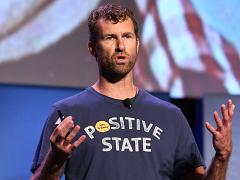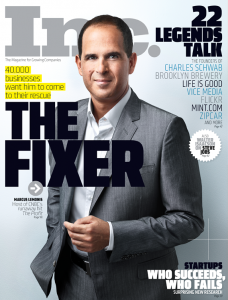I’ve been a dedicated reader of Inc. magazine and its Mansueto Ventures sister publication, Fast Company, for more than a decade. Last week, Inc. brought its ICONIC Conference to an iconic venue in Downtown Los Angeles (DTLA) and after a whirlwind day of panels and networking breakouts, I realized why the magazine has held my attention for so many years.
The first question you might ask is why anybody dedicated to cultural pursuits would want to venture into a full day of presentations about business. The obvious truth is that we all have to behave as if we are entrepreneurs and our careers are startups. But the more interesting discovery is the way that Inc. weaves two of our truths – emotion and vulnerability – into the elements that build a successful business. While there were a number of panels, I am going to focus on three of the solitary presenters for two very important reasons: you’ll recognize who they are and know something about the businesses they run; and after hearing what they have to say you will embrace their businesses as models of what you can do in your creative careers.
Bert Jacobs and his brother came from humble beginnings, the two youngest of six siblings raised outside of Boston. A tragic car accident cost their father – a craftsman – the use of his right arm and, ultimately, his career. While their father sank into a deep depression, their mother remained an eternal optimist. Every night around the dinner table, she’d ask the kids to talk about something funny or good that happened at school that day. Before long, the family was laughing together and the depression was momentarily lifted. When the Jacobs brothers graduated from college, they went through a series of failed business efforts. Eventually, they created their iconic character – Jake – and the slogan “Life Is Good” became the start of what is now a $100 million tee shirt and accessory business. 10% of everything the company makes is funneled into Project Joy – a nonprofit children’s charity. Jacobs titled his presentation THE MEASURE OF SUCCESS IS YOUR ABILITY TO ADAPT YOUR SUPERPOWERS and began with the thesis that we each have one story – the story of our life. Life isn’t easy and it isn’t perfect but, as their slogan suggests, LIFE IS GOOD.
According to Jacobs, the superpowers we all have within us are:
- COURAGE – “the work will teach you how to do it”
- OPENNESS – “the answer you’re looking for can come from anywhere”
- SIMPLICITY – “because everybody needs to understand what you do”
- STAYING COOL – “do what you love and love what you do”
- GRATITUDE – “shift your thinking from ‘have to do’” to ‘get to do’”
- COMPASSION – “takers may eat well, but givers sleep well”
- AUTHENTICITY – “gain and keep customers by talking about your life”
- LISTENING – “your customers will let you know what resonates with them”
- POSITIVE STATE – “their message isn’t an American message, it’s a human message”
- CREATIVITY – “innovate out of thin air”
- LOVE – “when you’re dying you shouldn’t wish you’d done different things”
Ultimately, Jacobs believes the secret formula for living a happy life is optimism. Wear one of his shirts for a single day and watch how happily people react to you as an optimist.
In a completely different direction, you can’t be on this planet and not have heard about GoDaddy by now. But how much do you really know about its founder, Bob Parsons? His company, YAM Worldwide, is named for a self-deprecating expression “You’re A Mess.” More aptly, Parsons is – as they say in the South – a hoot. He failed in Catholic school. He failed in high school. He joined the Marines and went to Vietnam where he set the goal of staying alive every day until mail call – and that became the turning point in his life. 32,000 soldiers were killed or wounded every week, but Parsons didn’t worry about getting hurt. He didn’t worry about dying. He just focused on mail call and that enabled him to do his job and survive.
Nobody in Parson’s family had been to college, but the GI Bill afforded him the opportunity to attend the University of Baltimore. He discovered that he was good at math and majored in accounting. In the seventies, he bought a book on programming in Basic computer language and taught himself programming. He formed Parsons Technology in his basement with $15,000 – which he quickly lost. He used his credit cards to get another $25,000 and lost that. But, because it was important to him, he always paid his bills – which is how he was able to continue to build his company on credit. Parsons made $287,000 in his first year of operation, $2.5 million in his second year and $5 million in the year after that – ultimately selling his company to Intuit for $64 million.
His next step was to “try everything on the Internet to see what works.” Building websites turned out to be his best venture – but the process of getting a URL was so complicated. GoDaddy sold their first domain name in November of 2000 – www.GhettoJustice.com. Today, the company has 70% market share and does business in every country around the world. After going public, the current valuation is $2.25 billion. If none of this had worked out, Parson’s Plan B was to be “the stick man at a craps table.” Having walked through fire to get to the top of his game, Parsons warns that “the greatest temptation is to quit when you are on the brink of success.” His brother told him that “there’s always a reason to smile – find it!” In his own words, “we’re not here for a long time, so we might as well be here for a good time.”
The conference closed with a presentation from Marcus Lemonis, now infamous for being “The Turnaround King” on his CNBC program, The Profit. Lemonis believes that there is a solution for everything and that the key to life is being yourself. His presentation focused on two themes: vulnerability and doing what you are supposed to do in life. He spoke candidly about the challenges he has faced. Adopted from an orphanage in war-torn Beirut at the age of 12, he weighed 200 pounds by the age of 13 and was molested by a family member – a secret he kept from his beloved mother by never speaking of it while she was still alive.
Lemonis believes that truth in life is about connecting with people through vulnerability. To that end, he convinced a dozen audience members to come to the front of the theatre to disclose their darkest secrets to a roomful of colleagues and potential business contacts. Life is about “soul cleansing” to Lemonis and he makes himself vulnerable to establish a connection to people. His philosophy is that “you wake up every day and tell yourself that this is the day everything is going to happen.” He channels his wild insecurity into helping the underdog because it’s like looking into a mirror. He believes that everybody has a purpose, even if they don’t know what it is on any particular day. How’s that working for him? After the first season of The Profit, Lemonis receive more than 40,000 requests from struggling small businesses, urging him to use his show to help them survive and thrive.
The ultimate takeaway from this event is that everybody in the creative industries needs to shift their thinking. Success in the entertainment industry is often a fluke. However, success in business is a process that involves patterns and procedures that can be replicated and may increase the likelihood of sustainable success. So while you continue to do what you are already doing to further your career, consider adding Inc. and Fast Company to your required reading list each month.



